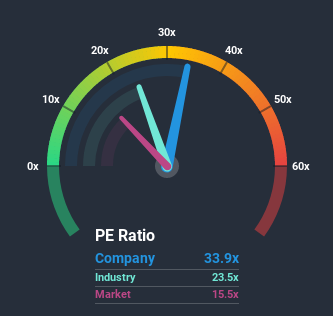Blackmores Limited's (ASX:BKL) Shareholders Might Be Looking For Exit

Want to participate in a short research study? Help shape the future of investing tools and earn a $40 gift card!
Blackmores Limited's (ASX:BKL) price-to-earnings (or "P/E") ratio of 33.9x might make it look like a strong sell right now compared to the market in Australia, where around half of the companies have P/E ratios below 15x and even P/E's below 9x are quite common. However, the P/E might be quite high for a reason and it requires further investigation to determine if it's justified.
Blackmores could be doing better as its earnings have been going backwards lately while most other companies have been seeing positive earnings growth. One possibility is that the P/E is high because investors think this poor earnings performance will turn the corner. If not, then existing shareholders may be extremely nervous about the viability of the share price.
See our latest analysis for Blackmores
Does Blackmores Have A Relatively High Or Low P/E For Its Industry?
An inspection of average P/E's throughout Blackmores' industry may help to explain its particularly high P/E ratio. It turns out the Personal Products industry in general also has a P/E ratio significantly higher than the market, as the graphic below shows. So it appears the company's ratio could be influenced considerably by these industry numbers currently. Some industry P/E's don't move around a lot and right now most companies within the Personal Products industry should be getting a strong boost. We'd highlight though, the spotlight should be on the anticipated direction of the company's earnings.
If you'd like to see what analysts are forecasting going forward, you should check out our free report on Blackmores.
Is There Enough Growth For Blackmores?
Blackmores' P/E ratio would be typical for a company that's expected to deliver very strong growth, and importantly, perform much better than the market.
If we review the last year of earnings, dishearteningly the company's profits fell to the tune of 47%. The last three years don't look nice either as the company has shrunk EPS by 54% in aggregate. Therefore, it's fair to say the earnings growth recently has been undesirable for the company.
Looking ahead now, EPS is anticipated to climb by 13% per year during the coming three years according to the nine analysts following the company. Meanwhile, the rest of the market is forecast to expand by 12% per annum, which is not materially different.
With this information, we find it interesting that Blackmores is trading at a high P/E compared to the market. It seems most investors are ignoring the fairly average growth expectations and are willing to pay up for exposure to the stock. These shareholders may be setting themselves up for disappointment if the P/E falls to levels more in line with the growth outlook.
The Key Takeaway
Using the price-to-earnings ratio alone to determine if you should sell your stock isn't sensible, however it can be a practical guide to the company's future prospects.
Our examination of Blackmores' analyst forecasts revealed that its market-matching earnings outlook isn't impacting its high P/E as much as we would have predicted. Right now we are uncomfortable with the relatively high share price as the predicted future earnings aren't likely to support such positive sentiment for long. This places shareholders' investments at risk and potential investors in danger of paying an unnecessary premium.
You should always think about risks. Case in point, we've spotted 4 warning signs for Blackmores you should be aware of.
Of course, you might also be able to find a better stock than Blackmores. So you may wish to see this free collection of other companies that sit on P/E's below 20x and have grown earnings strongly.
This article by Simply Wall St is general in nature. It does not constitute a recommendation to buy or sell any stock, and does not take account of your objectives, or your financial situation. We aim to bring you long-term focused analysis driven by fundamental data. Note that our analysis may not factor in the latest price-sensitive company announcements or qualitative material. Simply Wall St has no position in any stocks mentioned.
Have feedback on this article? Concerned about the content? Get in touch with us directly. Alternatively, email editorial-team@simplywallst.com.

